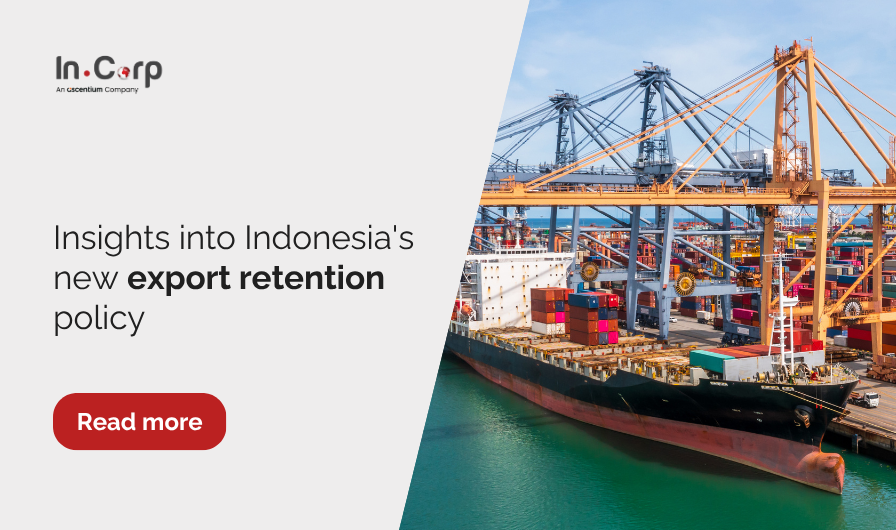Indonesia export regulations have changed with the introduction of a new policy requiring exporters to keep their foreign earnings in local banks. This measure aims to strengthen foreign exchange reserves and shield the economy from global risks.
This article explains why the policy matters and how businesses can remain compliant and competitive under the new rules.
Why the new retention policy is important
Indonesia recently significantly changed its foreign exchange rules through Government Regulation Number 8 of 2025. The Indonesia export retention policy mandates that natural resource exporters keep all foreign currency earnings within the local financial system for at least one year.
The Indonesia export retention policy is key to maintaining the country’s economic stability. It ensures that export revenues strengthen the national economy and support financial resilience.
Securing Indonesia’s Foreign Exchange Reserves
Previously, many exporters kept funds overseas, reducing currency inflow. Under the new Indonesia export rules, onshore retention supports foreign reserves, helping cover imports and manage debt.
Stabilizing Local Currency
The policy helps reduce pressure on the Indonesian rupiah by improving foreign currency availability in local markets. A stable rupiah means lower inflation and more predictable costs for businesses and consumers.
Boosting Investor Trust
The Indonesia export strategy reinforces reserves and currency strength, improving the nation’s investment climate.
Reducing Dependence on Foreign Loans
With more foreign currency retained domestically, Indonesia can rely less on foreign loans, making the economy more resilient to global financial shifts and risks.
Read more: Expect export earnings policy to boost forex reserves
What are the key updates?
The new Indonesia export earnings retention policy introduces several essential rules that exporters must follow. Here are the essential updates on the current policy:
1. Mandatory Onshore Placement
Exporters in sectors like mining, plantation, fisheries, and forestry must place their foreign currency earnings in special accounts at the Indonesian Export Financing Institution or foreign exchange banks approved by the Financial Services Authority.
2. Minimum Retention Period
Export proceeds must remain in these accounts for at least one year before they can be accessed or used. This is a significant change from the previous rule, where only 30% of the earnings were held for three months.
3. Permitted Use of Retained Earnings
Exporters are allowed to utilize retained funds for specific purposes, including:
- Converting foreign currency into Indonesian rupiah through authorized banks
- Making tax and non-tax payments to the state
- Paying out dividends in foreign currency
- Purchasing raw materials and capital goods
- Servicing foreign currency loans
4. Stronger Monitoring and Reporting
Companies must report regularly on the placement and use of their export earnings. The central bank and other regulatory bodies will actively oversee and enforce compliance with these requirements.
Key incentives for exporters: Special tax benefits
To encourage compliance, the government offers tax incentives, including a 0% income tax rate on interest income generated from foreign exchange accounts in Indonesia. Exporters following the Indonesia export rules can:
- Lower their tax obligations on interest earned from the retained funds
- Benefit from simplified procedures when fulfilling tax and non-tax state payments
- Gain the possibility of reduced withholding taxes
Read more: Navigating import duties and taxes in Indonesia.
How the new regulations affect exporters
The new Indonesia export retention policy impacts how businesses manage foreign earnings:
Tighter Control Over Export Proceeds
The mandatory placement of foreign currency earnings into Indonesian bank accounts for a year limits the flexibility to move funds freely across borders.
Impact on Cash Flow Management
With earnings locked in for longer, exporters must carefully plan their cash flow. Delays in accessing funds could affect operational costs, loan repayments, or investment decisions.
Potential Compliance Risks
Failure to follow the new rules may result in sanctions, fines, or suspension of export permits. Exporters need to ensure full compliance to avoid issues with their business operations.
Adjustment In Banking Relationships
To comply with the policy, exporters may need to open new accounts or restructure existing ones with Indonesian banks authorized to handle foreign exchange transactions.
Initial strategies for investors
The new export earnings retention policy may limit cash flow flexibility and add compliance tasks for exporters. However, robust cash flow planning can manage these challenges. Proper cash management helps ensure the one-year retention period does not disrupt daily business.
Businesses should also actively manage currency risks using tools like forward contracts or currency swaps. These strategies help protect the value of foreign earnings from exchange rate fluctuations during the retention period.
By focusing on the right strategies, exporters can stay compliant and keep their operations running smoothly under the new policy.
Read more about Indonesia’s top export-import business ideas.
Grow your business in Indonesia with InCorp.
The updated Indonesia export regulations create challenges but also opportunities for businesses. With expert guidance, companies can turn these requirements into a strategic advantage.
InCorp Indonesia (An Ascentium Company) is ready to assist your business with reliable solutions. From company registration to import service, we will ensure smooth business operations and compliance with Indonesian regulations.
Get started today by filling out the form below, and let us make your export journey simple and successful.
Get in touch with us.
What you'll get
A prompt response to your inquiry
Knowledge for doing business from local experts
Ongoing support for your business
Disclaimer
The information is provided by PT. Cekindo Business International (“InCorp Indonesia/ we”) for general purpose only and we make no representations or warranties of any kind.
We do not act as an authorized government or non-government provider for official documents and services, which is issued by the Government of the Republic of Indonesia or its appointed officials. We do not promote any official government document or services of the Government of the Republic of Indonesia, including but not limited to, business identifiers, health and welfare assistance programs and benefits, unclaimed tax rebate, electronic travel visa and authorization, passports in this website.




